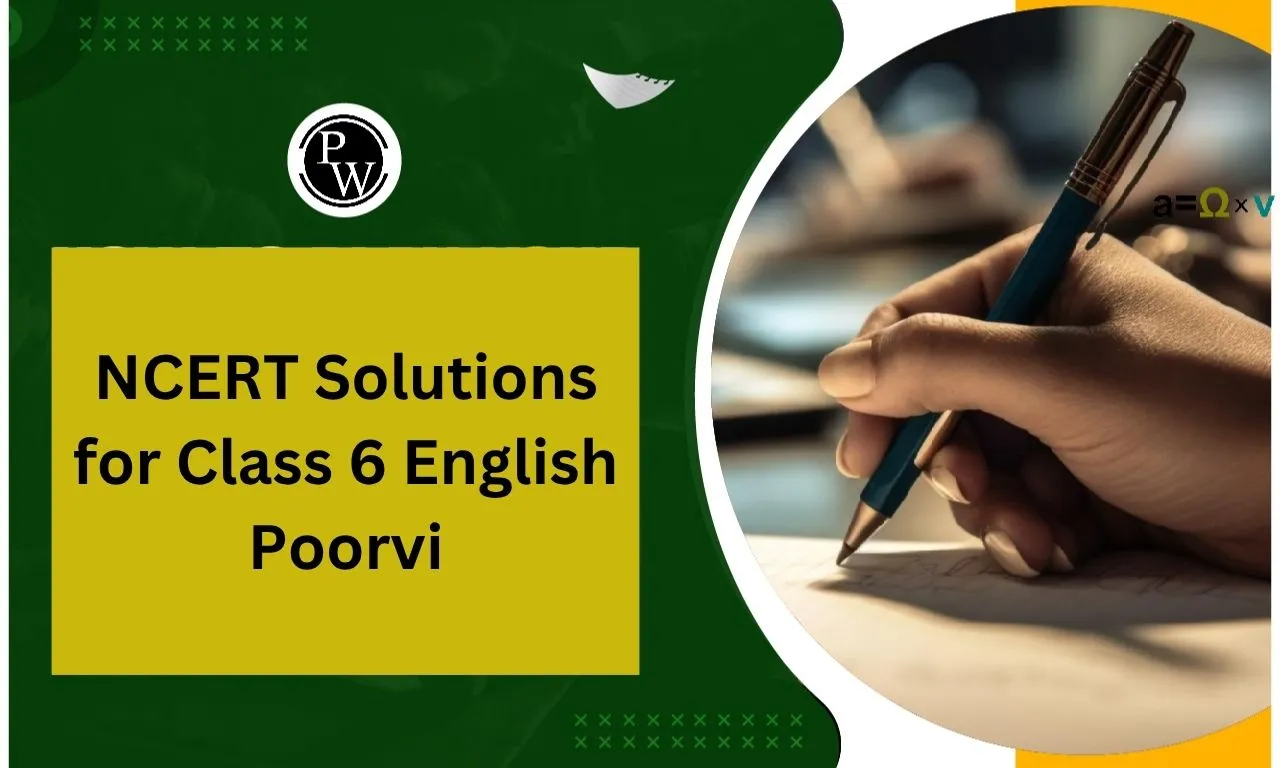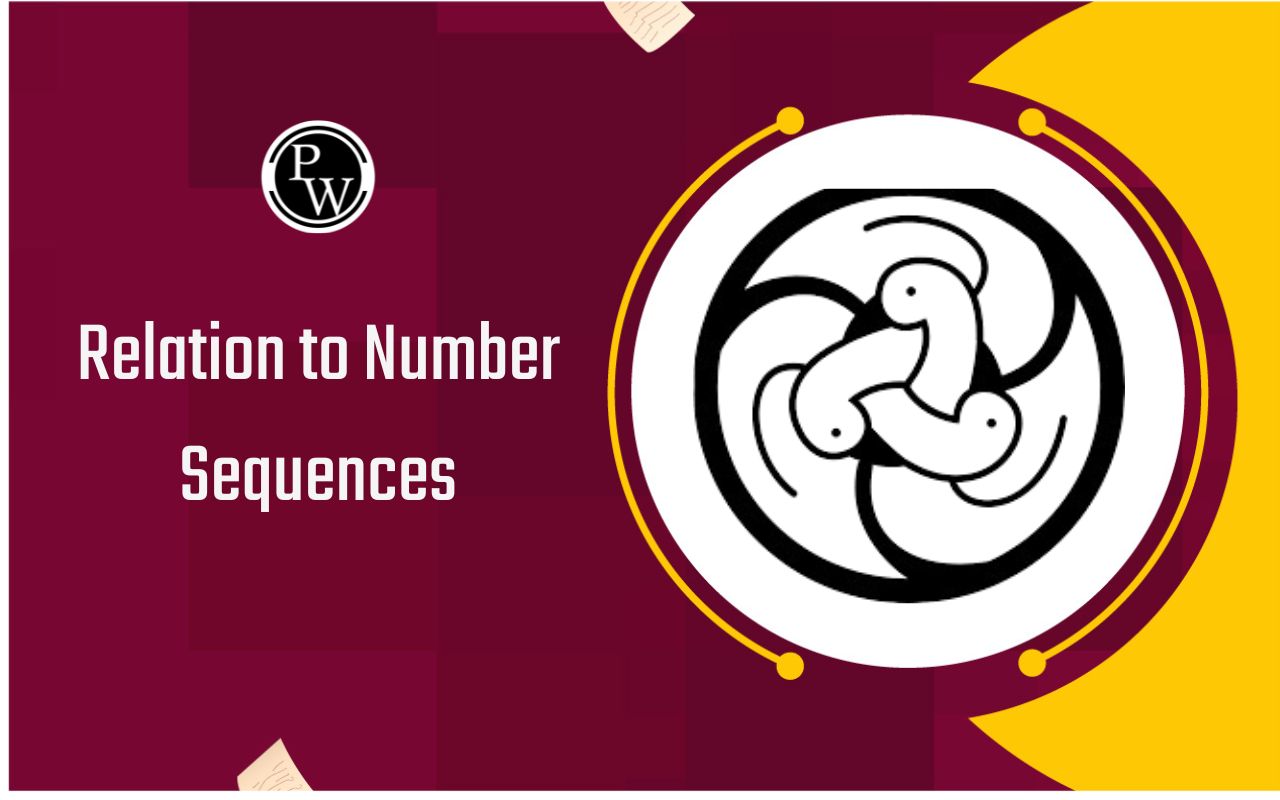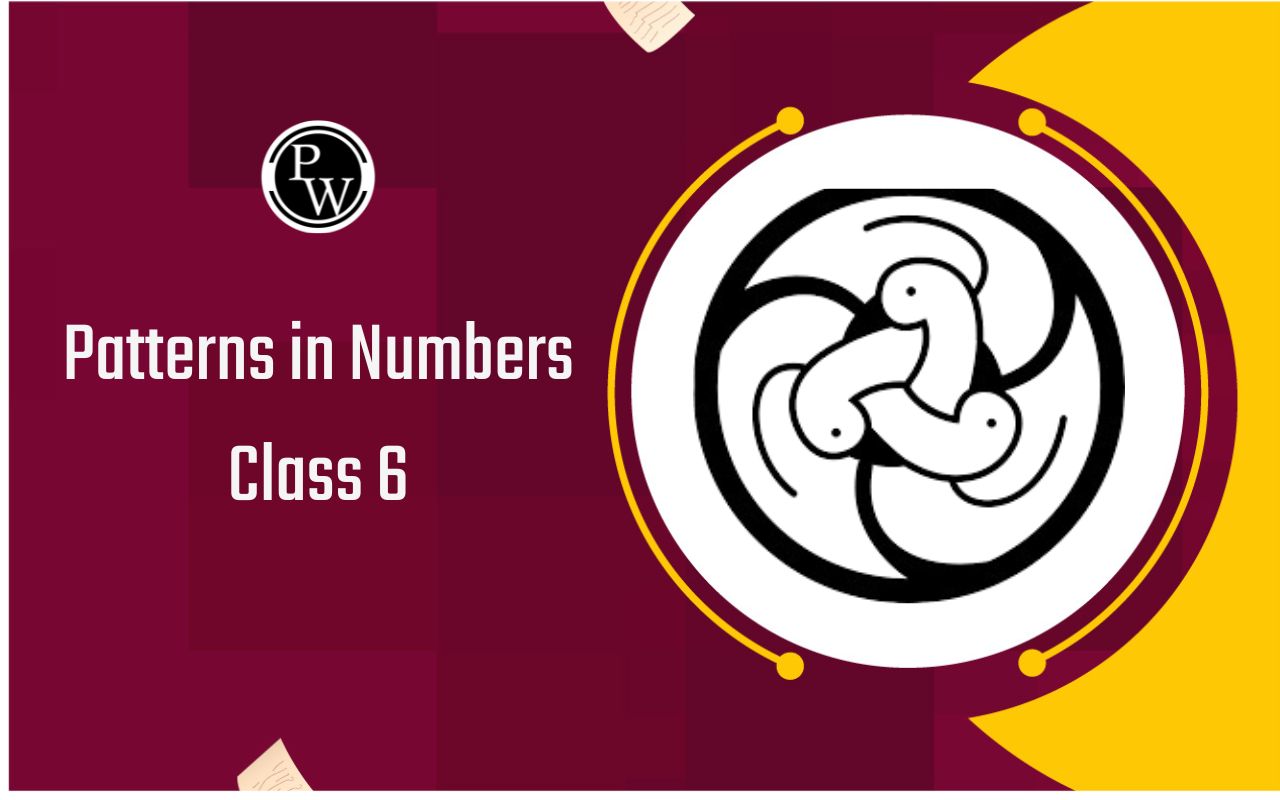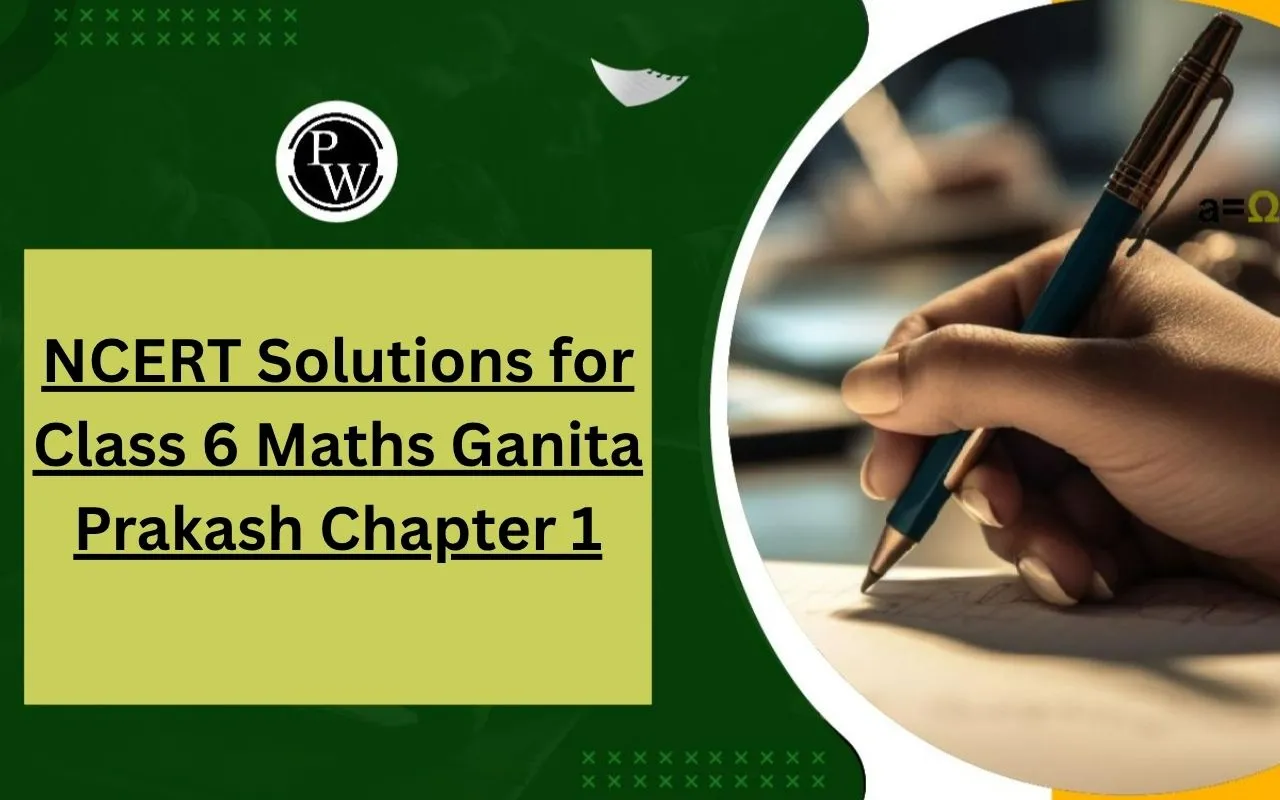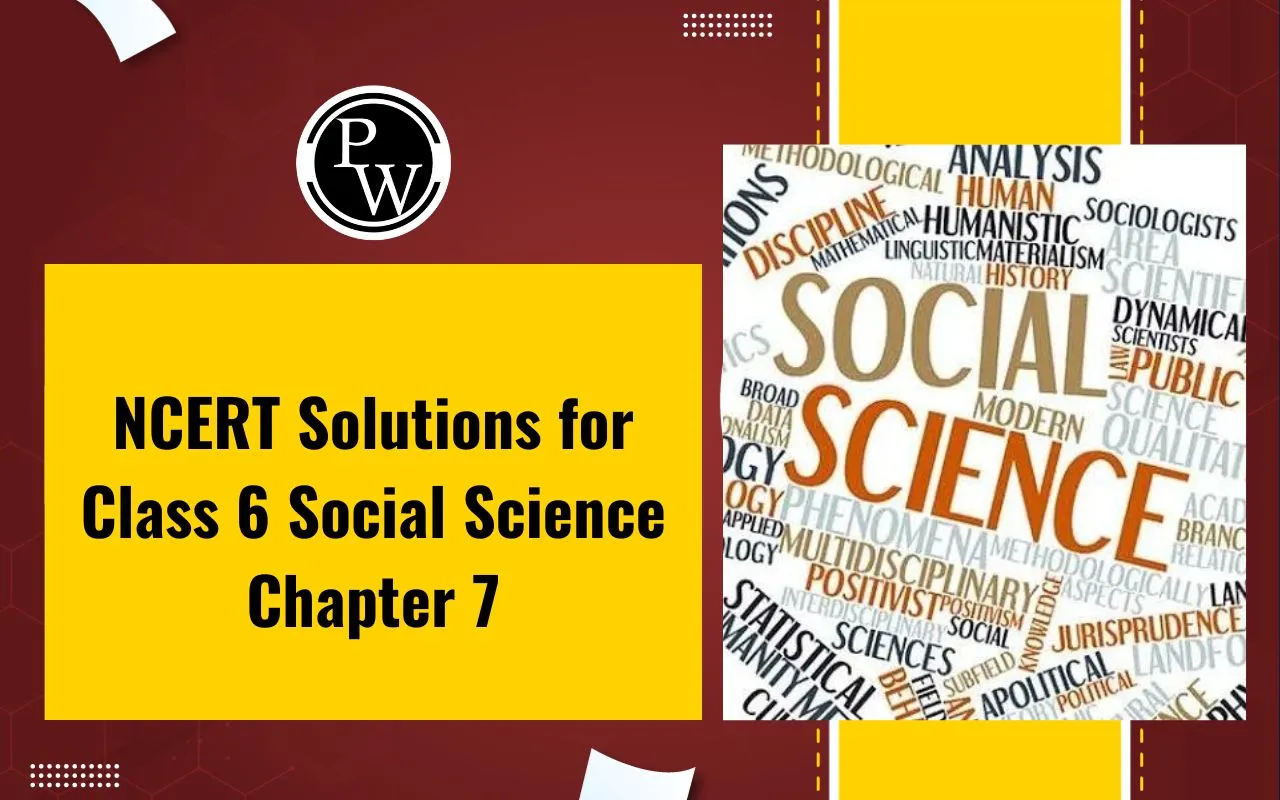
NCERT Solutions for Class 6 English Poorvi Unit 2 Chapter 6 are prepared as per the latest NCERT syllabus, covering all chapters and exercises from the Class 6 textbook.
These solutions are designed to match the exam pattern followed by most schools, emphasizing comprehension, vocabulary enhancement, grammar practice, and analytical skills. Using these solutions, students can confidently prepare for their school exams and boost their performance in both formative and summative evaluations.
NCERT Solutions for Class 6 English Poorvi Unit 2 Chapter 6 Overview
In this chapter, Mario receives a special invisible chair from his grandfather that has magical powers.
The challenge is to sit on this invisible chair, which is tricky because it cannot be seen. Mario tries hard to balance himself and sit properly, but he struggles and falls several times.
Through this experience, Mario learns a valuable lesson about friendship. The chair helps him discover who his true friends are—those who support and help him, especially when things get difficult. The story teaches the importance of loyalty, trust, and genuine friendship.
NCERT Solutions for Class 6 English Poorvi Unit 2 Chapter 6 The Chair
Here are the solutions for Class 6 English Poorvi Unit 2 Chapter 6 The Chair. These solutions will help you understand the poem better and prepare for your exams with confidence.
Let us do these activities before we read.
1. Write two words that come to your mind when you think of friendship.
Answer:
loyal, caring
(a) Now, find some more words that are related to friendship from the grid given below. You can search horizontally or vertically. There are eight words. One word has been marked as an example. The first letter of each word has been given in bold.
Answer:
(b) Fill in the blanks to complete the words, which mean the same as ‘friend’ or ‘friends’ with the help of the meanings.
|
Meaning |
Word |
|
(i) a person who you do things together with |
p __ r __n __ r |
|
(ii) an informal word for friends |
b __ __ d __ __ s |
|
(iii) a person who you spend a lot of time with |
c __ m p __ n __ o __ |
|
(iv) children who are in the same class as you at school |
c l __ s __ m__ t __ s |
Answer:
|
Meaning |
Word |
|
(i) a person who you do things together with |
p a r t n e r |
|
(ii) an informal word for friends |
b u d d i e s |
|
(iii) a person who you spend a lot of time with |
c o m p a n io n |
|
(iv) children who are in the same class as you at school |
c l a s s ma t es |
c) There are so many words for a friend. What do you call ‘a friend’ in your own language?
Answer:
I call a friend दोस्त (Dost) or यार (Yaar) in Hindi.
Let us discuss (Page 61)
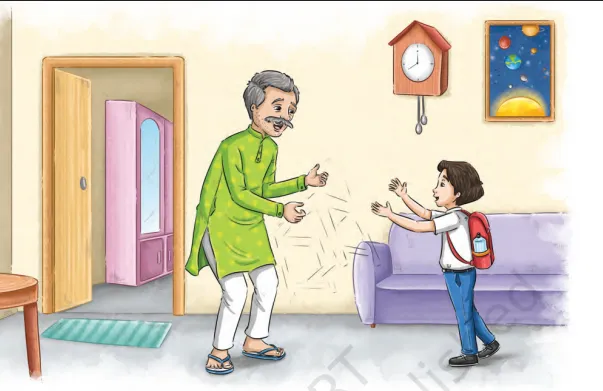
1. Mario was very proud of having so many friends.
Answer: True
2. What did the grandfather take from the attic?
Answer: The grandfather brought down a special chair from the attic that was invisible.
3. Will Mario face any challenges?
Answer: Yes, Mario will have a hard time trying to sit on the invisible chair.
4. Will Mario be able to use the magic?
Answer: Mario can only use the magic if he manages to sit properly on the invisible chair. It depends on whether he succeeds or not.
Let us discuss (Page 64)
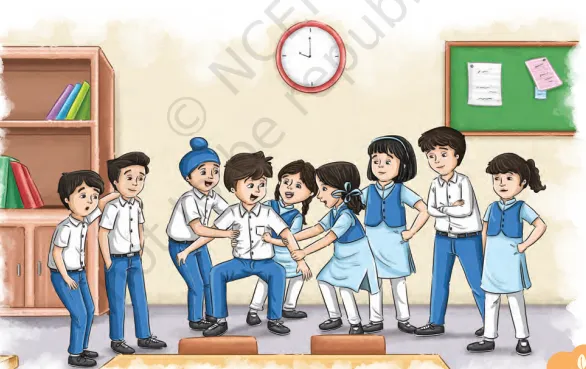
1. Mario successfully sat on the invisible chair on his first attempt. State whether True or False.
Answer: False
2. Fill in the blank with a suitable word.
Mario’s grandfather challenged him to a bet of __________.
Answer:
Mario’s grandfather challenged him to a bet of fruit chaat.
3. Match the following characters with their action.
|
Guneet, Asma and Deepa |
a. held Mario up, so he wouldn’t fall b. made fun of Mario’s attempts |
Answer:
Guneet, Asma and Deepa held Mario up, so he wouldn’t fall.
Let us think and reflect (Page 64)
1. Read the following lines and answer the questions that follow.
(a) “Take it. It’s a very special chair. As it’s invisible, it’s rather tricky to sit on. But if you take it to school and manage to sit on it, then the magic will work and you’ll be able to tell who your real friends are.”
(i) Fill in the blanks with two words that describe the chair.
The chair is _____________ and ___________.
Answer:
The chair is special and invisible.
(ii) Why was it tricky to sit on the chair?
Answer:
It was hard to sit on the chair because it was invisible, so Mario couldn’t see where to sit properly.
(iii) Why does Mario’s grandfather call the chair ‘special’?
Answer:
Mario’s grandfather calls it special because it helps Mario find out who his real friends are.
(i) Mario says there was a technical problem because ___________.
Answer:
Mario said there was a problem because he couldn’t see the invisible chair.
(ii) Mario’s friends were very caring and helpful. State whether True or False.
Answer:
False. Most of Mario’s friends laughed at him, except for Guneet, Asma, and Deepa who were kind.
(iii) Choose the correct option to complete the sentence.
Mario wouldn’t give up. This shows he is _____________.
a. strong-willed
b. supportive
c. loving
d. hard-working
Answer:
strong-willed.
(a) What was the bet about?
Answer:
The bet was about whether Mario really had as many true friends as he thought. His grandfather believed that many of the people Mario called friends were just acquaintances.
(b) What happened when Mario sat on the chair for the first time?
Answer:
When Mario tried to sit on the invisible chair the first time, he lost his balance and fell. His classmates laughed at him.
(c) How was Mario able to find his real friends?
Answer:
Mario found out who his real friends were when Guneet, Asma, and Deepa helped him stay steady on the invisible chair, while the others just laughed.
(d) Do you think the magic chair test was good? Why do you say so?
Answer:
Yes, the magic chair test was useful because it showed Mario who truly cared for him by seeing who helped him when he needed it.
(e) What does ‘friends for life’ mean to you?
Answer:
To me, ‘friends for life’ means friends who always care for you, support you, and stay by your side no matter what happens.
(f) The grandfather’s idea helped Mario find his ‘real friends’. Mention any other way that would help you find out who are your ‘real friends’.
Answer:
Another way to find real friends is to notice who stays with you and supports you during hard times without asking for anything in return.
Let us learn (Page 65)
1. Read the following words from the text.
|
friendly |
suddenly |
talking |
carrying |
called |
showed |
Complete the following table by dividing the words into two parts. One has been done for you
|
Column A |
Column B |
|
1. friend |
ly |
|
2. sudden |
ly |
|
3. talk |
ing |
|
4. carry |
ing |
|
5. call |
ed |
|
6. show |
ed |
The words in Column A are called the root words. The sequences of letters that are in Column B
which come after the root words are called suffixes.
2. Match the following root words with suitable suffixes. You can use a suffix more than once as shown. Use them to make sentences of your own. One has been done for you.
|
Sl |
Root word |
suffix |
Word |
Sentence |
|
1. |
magic |
-ing |
magical |
The magician performed an amazing magical act. |
|
2. |
care |
–al |
|
|
|
3. |
celebrate |
-ful |
|
|
|
4. |
laugh |
-ly |
|
|
|
5. |
wonder |
-ed |
|
|
|
6. |
help |
-tion |
|
|
|
7. |
friend |
-ous |
|
|
|
8. |
courage |
-ship |
|
|
Answer:
|
Sl |
Root word |
suffix |
Word |
Sentence |
|
1. |
magic |
-ing |
magical |
The magician performed an amazing magical act. |
|
2. |
care |
-al |
careful |
Be careful while crossing the main road! |
|
3. |
celebrate |
-ful |
celebration |
My grandmother’s ninetieth birthday celebration was grand and joyful. |
|
4. |
laugh |
-ly |
laughed |
Everyone laughed at the comical clown. |
|
5. |
wonder |
-ed |
wonderful |
The children had a wonderful time at the beach. |
|
6. |
help |
-tion |
helpful |
The old boarders were very helpful in making the new ones settle down comfortably. |
|
7. |
friend |
-ous |
friendship |
Their friendship has grown and deepened over the years. |
|
8. |
courage |
-ship |
courageous |
The courageous soldiers rescued many civilians buried in the landslide. |
3. Read the following lines from the story.
Mario, brave and determined, took the strange invisible chair …
You have already described the chair. Now, describe what kind of a person Mario is in the image given below.
[Use words from the story. You may also use words of your own.]
The words that describe the quality of a person or a thing are called adjectives.
4. Match each word (adjectives) in Column A with a suitable word (noun) in Column B. You can make more than one combination. One has been done as an example.
|
Column A (Adjectives) |
Column B (Nouns) |
Column C (Phrases) |
Column D (Sentences) |
|
1. brave |
friends |
Brave friends |
The brave friends stood by each other during the challenge. |
|
2. clever |
plan |
Clever plan |
She made a clever plan to solve the problem quickly. |
|
3. tasty |
peanuts |
Tasty peanuts |
We enjoyed the tasty peanuts at the party. |
|
4. heavy |
rain |
Heavy rain |
The heavy rain lasted all night and flooded the streets. |
|
5. slight |
cold |
Slight cold |
He caught a slight cold but felt better the next day. |
|
6. true |
friends |
True friends |
True friends always support you in difficult times. |
5. Complete the paragraph with suitable adjective-noun pairings. Use the words in the box given below.
|
old book |
magical adventures |
happy boy |
amazing stories |
|
fantastic adventures |
colourful creatures |
old castles |
|
Once upon a time in a little village, a/an (i) __________________ named Abhishek found a/an (ii) __________________ in the attic. He read (iii) __________________ about fairy lands, (iv) __________________ and (v) __________________. Abhishek’s eyes got big as he imagined these (vi) __________________. He told his friends about the stories, and they started to have their own (vii) __________________ when they played together.
Answer:
Once upon a time in a little village, a(i) happy boy named Abhishek found an (ii) old book in the attic. He read (iii) amazing stories about fairy lands, (iv) old castles and (v) colourful creatures. Abhishek’s eyes got big as he imagined these (vi) magical adventures. He told his friends about the stories, and they started to have their own (vii) fantastic adventures when they played together.
Let us listen (Page 68)
You will listen to Manu talk about her friend, Monika. As you listen, fill in the blanks with words that you hear. (refer to page 73 for transcript)
(a) Monika found it _____________ when she took admission in the school.
(b) Manu was _____________ and helped by her in many ways.
(c) So, it was not so _____________ for the new girl to adjust in the school.
(d) Both friends experienced difficult and _____________ moments together.
(e) Manu is _____________ to Monika for making her life easy and finding a friend.
Answer:
(a) Monika found it difficult when she took admission in the school.
(b) Manu was supportive and helped by her in many ways.
(c) So, it was not so uncomfortable for the new girl to adjust in the school.
(d) Both friends experienced difficult and happy moments together.
(e) Manu is grateful to Monika for making her life easy and finding a friend.
Let us speak (Page 68)
1. Work in pairs. Read the following qualities of a friend.
|
loving |
honest |
kind |
caring |
loyal |
|
polite |
respectful |
Team-worker |
understanding |
|
Discuss in pairs. Choose any four positive qualities that you would like your friend to have. Give a reason for your choice. Use the hints given below when you speak.
I feel my friend should be … because …
I think the quality I want in my friend is being …. The reason for this is …
I believe my friend should be … This is in order to …
If my friend is … then …
Answer:
When I think about the qualities I want in a friend, I choose loving, honest, loyal, and understanding.
Loving: I feel my friend should be loving because a loving friend shows warmth and care, and accepts me even when I make mistakes.
Honest: I think the quality I want in my friend is honesty. The reason is that I want someone I can completely trust and count on in any situation.
Loyal: I believe my friend should be loyal so that they always stand by me and support me, no matter what happens.
Understanding: If my friend is understanding, then we can solve problems calmly and avoid unnecessary fights, which helps keep our friendship strong.
Let us write (Page 69)
1. Read the messages that Mario has written to his friends Deepa, Guneet and Asma.
Dear Deepa,
I feel so special that you are my friend. I know you will always be there for me. Before going to bed, I said a little prayer for Guneet, Asma and you. You made me realise the value of having good friends.
Best wishes,
Mario
Dear Asma,
I feel blessed to know that you are my true friend. I would have fallen again today, if it wasn’t for Guneet, Deepa and you. I know I can always depend on the three of you, no matter what.
Best wishes,
Mario
(a) Now, choose the correct word given in brackets to complete Mario’s
message to Guneet.
Dear Guneet,
I am __________________ (thankful to/requesting) God to have you as a __________________ (lucky/real) friend for life. When everyone was __________________ (laughing at/talking to) me, Deepa, Asma and you showed me that you __________________ (will save/care for) me. You are indeed a __________________ (blessing/loving) in my life.
Best wishes,
Mario
Answer:
Dear Guneet,
I am thankful to (thankful to/requesting) God to have you as a real (lucky/real) friend for life. When everyone was laughing at (laughing at/talking to) me, Deepa, Asma and you showed me that you care for (will save/care for) me. You are indeed a blessing (blessing/loving) in my life.
Best wishes,
Mario
(b) Now, write your own message to your best friend. You may take ideas from the story, ‘The Unlikely Best Friends’ and the poem, ‘A Friend’s Prayer’.
Dear Pihu
I feel truly lucky to have a friend like you. Your friendship means the world to me. You have always been there for me, even during tough times, and I am really thankful for your patience, support, and encouragement.
Our friendship is one of the most special parts of my life, and I hope I can always be the kind of friend you need. I want to be someone who understands you, stands by you, and shares both your happiness and challenges.
Thank you for being such a loyal and wonderful friend. I cherish all the memories we’ve made and look forward to many more ahead.
With lots of love,
Anshika
Let us explore (Page 70)
1. Find out more stories about ‘Friendship’. It could be from your state, other states or other countries too. You can share them with your class.
Answer:
Stories about friendship.
Friendship is very special and important. Here are two stories about friendship from India that show how friends help and support each other:
-
Karna and Duryodhana
Karna was born in a royal family but was raised by a poor family. Many people didn’t treat him well. Duryodhana, a prince, became Karna’s true friend. He made Karna a king to help him. Karna stayed loyal to Duryodhana and stood by him always, even in hard times. Their friendship shows how friends help each other no matter what. -
Birbal and Akbar
Birbal was a smart and funny advisor to Emperor Akbar. They were good friends. One day, Akbar asked Birbal, “What is the most valuable thing in the world?” Birbal said, “A true friend.” Birbal once saved Akbar when he was in danger, proving that true friends care for each other and are more valuable than anything else.
2. Describe your friends by filling in the blanks with suitable words. This is
known as an acrostic poem.
F ________________
R ________________
I ________________
E ________________
N ________________
D ________________
S ________________
Answer:
F — Friendly: Always kind and ready to help.
R — Reliable: I can trust them anytime.
I — Interesting: Makes every moment fun and exciting.
E — Encouraging: Always cheers me on to do my best.
N — Nice: Treats everyone with kindness and care.
D — Dependable: Stands by me when I need help.
S — Supportive: Helps me when I am sad or in trouble.
3. Complete the following task by talking to different people of different age groups as mentioned in the table. You may divide the class into groups to do the following:
After gathering responses:
Discuss: similarities and differences across age groups.
Reflect: how viewpoints on friendship may change with age and life experiences.
Present: a summary of the group’s responses, emphasising key themes or unique insights.
|
Question |
Age group |
Response |
|
What does friendship mean to you? |
50+ |
|
|
31 to 49 |
|
|
|
20 to 30 |
|
|
|
12 to 19 |
|
|
Age Group |
Response |
|
50+ |
People over 50 see friendship as a deep connection with people who think like them. They love sharing memories and value friends who stay by them in hard times. They forgive small disagreements and enjoy celebrating special moments together. Their friends give them strength and happiness. |
|
31 to 49 |
People aged 31 to 49 want friends who are reliable and understand the stresses of adult life. They appreciate friends who support them and help with daily challenges like work and family. They look for friends who listen and give good advice. |
|
20 to 30 |
People aged 20 to 30 want friends who help them grow personally and in their careers. They need friends for advice about big decisions like jobs or relationships. They want friends who encourage and inspire them and have fun together. |
|
12 to 19 |
Teenagers look for friends who share their hobbies like sports, music, or games. They want friends for emotional support as they face school stress and family expectations. Friends help them feel accepted and build their self-confidence. Teens trust their friends with secrets and need them to understand who they are. |
Discussion: Similarities and Differences
-
Similarities: Everyone wants friends who are supportive, understanding, and trustworthy. They want to enjoy good times with their friends.
-
Differences: Younger people want friends who accept them and share their interests for fun and belonging. Older people want deep, lasting friendships based on trust and support through life’s challenges.
Reflection:
When we are young, we look for friends who help us fit in and explore new things. As we grow older, we appreciate friends who stay with us during good and bad times. Starting a job or family changes how we think about friendship. Older people value long-term friends who share memories and understand life.
Summary:
Friendship means different things at different ages. When young, we want friends to have fun with and to belong. When older, we want loyal friends who support us and share our life experiences. But no matter what, friendship stays important throughout our lives.
NCERT Solutions for Class 6 English Poorvi Unit 2 Chapter 6 PDF Download
Students can now download the NCERT Solutions for Class 6 English Poorvi Unit 2 Chapter 6 in PDF format. This will help you understand the chapter better and prepare well for exams.
NCERT Solutions for Class 6 English Poorvi Unit 2 Chapter 6
Study without using the internet
Benefits of Using NCERT Solutions for Class 6 English Poorvi Unit 2 Chapter 6
-
The solutions provide clear and simple explanations of the chapter’s text and exercises, making it easier to understand even the tough parts.
-
Using these solutions saves time during preparation, as you get accurate answers without needing to search elsewhere.
-
They cover all exercise questions and sometimes include extra practice, helping you revise the chapter completely.
-
These solutions follow the NCERT syllabus and exam pattern, ensuring you are well-prepared for tests and exams.
-
By using easy-to-understand and correct solutions, your confidence in English improves significantly.
-
They also help you complete homework and assignments accurately and on time.
NCERT Solutions for Class 6 English Poorvi Unit 2 Chapter 6 FAQs
How can these solutions help me in my exam preparation?
Are the solutions easy to understand for Class 6 students?
Do these solutions cover all types of questions from the chapter?
Can I use these solutions for revision?



